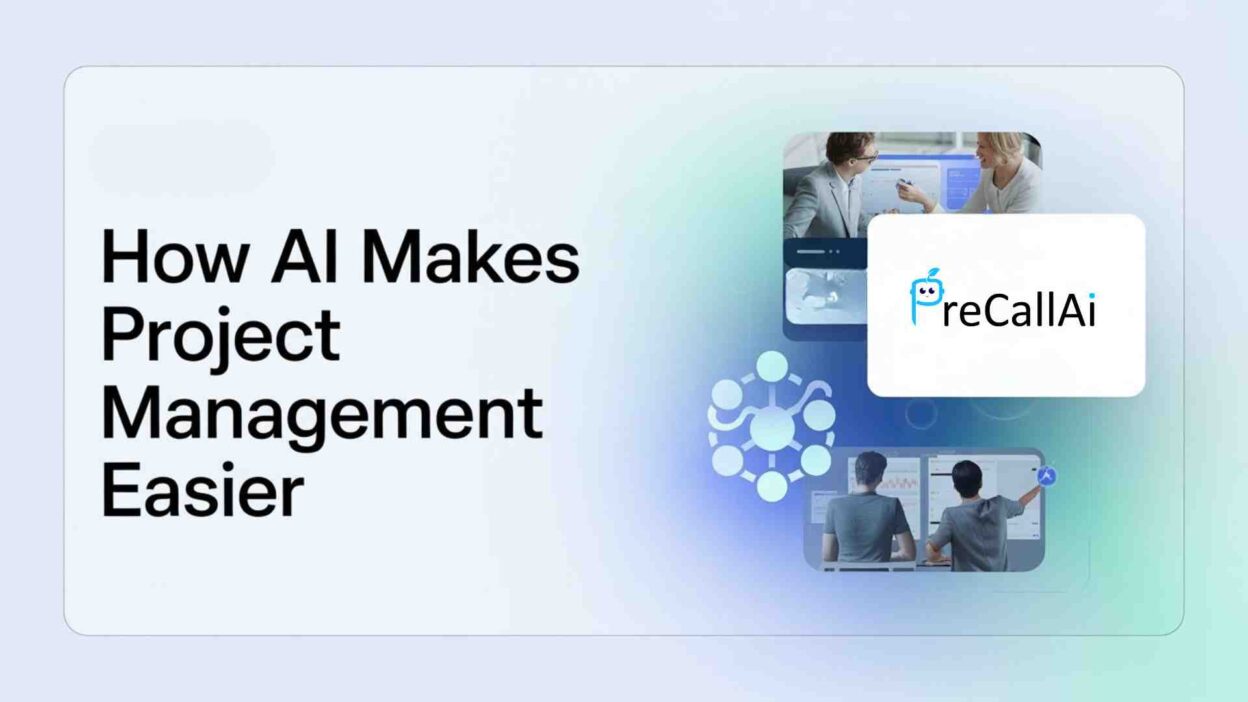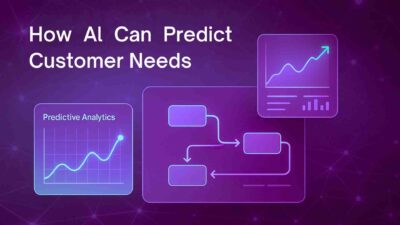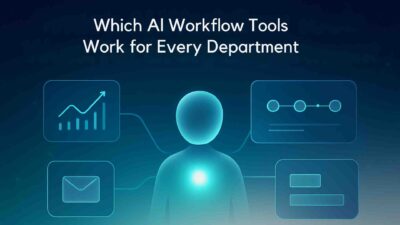TL;DR AI project management has revolutionized how teams plan, execute, and deliver successful projects across industries. Modern artificial intelligence tools automate routine tasks, predict project risks, and optimize resource allocation with unprecedented accuracy. Companies using AI-powered project management platforms report 35% faster project completion times and a 28% reduction in budget overruns.
Table of Contents
Project managers spend 68% of their time on administrative tasks rather than strategic planning. AI eliminates these bottlenecks by automating scheduling, tracking progress, and generating insights automatically. Smart algorithms analyze historical project data to provide recommendations that improve decision-making quality.
Understanding AI-Powered Project Management
Core AI Technologies in Project Management
Machine learning algorithms analyze project patterns to predict completion timelines accurately. Natural language processing extracts insights from team communications and project documentation. Computer vision technology processes visual project data like Gantt charts and workflow diagrams automatically.
Predictive analytics identify potential project risks weeks before they impact deliverables. Automated decision-making systems optimize resource allocation based on real-time project demands. Neural networks learn from successful project patterns to recommend best practices.
Key Benefits of AI Project Management Implementation
AI project management reduces manual administrative work by 60% for typical project teams. Automated scheduling eliminates conflicts and optimizes team member availability across multiple projects. Smart resource allocation ensures critical tasks receive appropriate attention and expertise.
Real-time risk assessment identifies potential problems before they cause delays or budget overruns. Automated reporting provides stakeholders with accurate project status updates without manual data compilation. Performance analytics reveal team productivity patterns that inform future project planning.
Evolution from Traditional to AI-Enhanced Management
Traditional project management relies heavily on manual planning and human judgment for decision-making. Spreadsheets and static documentation require constant manual updates that consume valuable time. Human error in scheduling and resource allocation creates project inefficiencies.
AI transforms project management into a data-driven discipline with automated insights and recommendations. Smart algorithms process vast amounts of project data faster than human analysis. Real-time adaptation allows projects to respond quickly to changing requirements and constraints.
AI-Driven Task Management and Automation
Intelligent Task Creation and Assignment
AI systems analyze project requirements to automatically break down complex deliverables into manageable tasks. Smart algorithms consider team member skills, availability, and workload when assigning tasks. Natural language processing converts project briefs into detailed task lists with estimated timeframes.
Automated task prioritization ranks activities based on dependencies, deadlines, and business impact. Machine learning models predict task complexity and adjust time estimates based on historical performance data. Dynamic reassignment optimizes task distribution when team members become unavailable.
Automated Progress Tracking and Updates
Project management AI monitors task completion rates and automatically updates project timelines. Integration with development tools, communication platforms, and document management systems provides real-time progress visibility. Smart notifications alert team members about approaching deadlines and dependencies.
Automated time tracking captures actual work hours without requiring manual input from team members. AI algorithms detect productivity patterns and suggest optimal work schedules for individual contributors. Real-time dashboard updates eliminate the need for manual status report preparation.
Smart Workflow Optimization
AI analyzes workflow bottlenecks and recommends process improvements to increase efficiency. Automated dependency management ensures tasks begin immediately when prerequisites complete. Machine learning identifies optimal task sequences that minimize project duration.
Dynamic workflow adjustment responds to scope changes and resource availability in real-time. AI systems learn from completed projects to refine workflow templates for similar future endeavors. Automated quality assurance checkpoints prevent defective work from progressing downstream.
Predictive Task Completion Forecasting
Advanced algorithms analyze historical performance data to predict accurate task completion dates. AI models consider external factors like holidays, team member vacation schedules, and organizational events. Predictive analytics identify tasks likely to exceed original time estimates.
Machine learning improves forecast accuracy by learning from actual completion patterns over time. Risk-adjusted timelines account for uncertainty and provide realistic project delivery dates. Automated schedule optimization minimizes project duration while maintaining quality standards.
Resource Management and Allocation Intelligence
AI-Powered Team Member Selection
AI project management systems analyze team member skills, experience levels, and past performance to recommend optimal project assignments. Machine learning algorithms match project requirements with available talent pools automatically. Skill gap analysis identifies training needs and external resource requirements.
Performance prediction models estimate individual productivity levels for specific types of work. AI considers team dynamics and collaboration patterns when forming project teams. Automated workload balancing prevents team member burnout and maintains consistent productivity.
Dynamic Budget Optimization
AI algorithms monitor project spending patterns and predict final budget requirements accurately. Automated cost tracking integrates with financial systems to provide real-time expense visibility. Machine learning identifies cost overrun risks and recommends corrective actions.
Dynamic budget reallocation optimizes resource distribution based on changing project priorities. AI systems negotiate virtual resource trades between projects to maximize organizational efficiency. Predictive cost modeling helps project managers make informed scope and timeline decisions.
Equipment and Infrastructure Planning
AI analyzes project requirements to determine necessary equipment, software licenses, and infrastructure resources. Automated procurement recommendations ensure required resources arrive when needed. Machine learning optimizes resource sharing across multiple concurrent projects.
Predictive maintenance scheduling prevents equipment downtime from disrupting project timelines. AI systems track resource utilization rates and recommend optimal inventory levels. Automated resource booking eliminates scheduling conflicts and maximizes asset utilization.
Capacity Planning and Forecasting
Advanced analytics predict organizational capacity requirements for future project portfolios. AI models consider seasonal demand patterns, growth projections, and market conditions. Resource planning algorithms recommend hiring schedules and skill development programs.
Dynamic capacity adjustment responds to unexpected project demands and market opportunities. Machine learning identifies underutilized resources that can support additional project work. Automated capacity reporting provides executives with strategic planning insights.
Risk Assessment and Mitigation Through AI
Predictive Risk Identification
AI project management platforms analyze thousands of risk factors to identify potential project threats early. Machine learning models process historical project data to recognize patterns that precede common problems. Automated risk scoring prioritizes threats based on probability and potential impact.
Natural language processing analyzes team communications, stakeholder feedback, and external market conditions for risk indicators. Predictive models identify scope creep tendencies before they affect project timelines. AI systems monitor team sentiment and workload stress levels that could impact performance.
Automated Risk Response Planning
AI algorithms generate comprehensive risk mitigation strategies based on successful responses to similar historical risks. Automated contingency planning creates alternative project paths when primary approaches face obstacles. Machine learning optimizes risk response resource allocation for maximum effectiveness.
Dynamic risk monitoring adjusts mitigation strategies as project conditions change. AI systems automatically implement predefined responses when specific risk thresholds are exceeded. Intelligent escalation processes ensure appropriate stakeholders receive timely risk notifications.
Real-Time Risk Monitoring
Continuous monitoring systems track project health indicators and alert managers to emerging risks instantly. AI analyzes project metrics, team performance, and external factors that could impact success. Automated anomaly detection identifies unusual patterns that warrant investigation.
Real-time dashboard updates provide project managers with current risk status across all active projects. Machine learning improves risk detection accuracy by learning from false positives and missed threats. Automated risk reporting keeps stakeholders informed about project stability and mitigation efforts.
Compliance and Quality Assurance
AI systems ensure project deliverables meet quality standards and regulatory requirements automatically. Automated compliance checking validates project outputs against industry standards and organizational policies. Machine learning identifies quality patterns that predict successful project outcomes.
Intelligent quality assurance workflows route deliverables through appropriate review processes automatically. AI monitors regulatory changes that could affect project requirements and recommendations adjustments. Automated audit trail generation provides comprehensive project documentation for compliance purposes.
Communication and Collaboration Enhancement
Intelligent Meeting Scheduling and Management
AI project management tools analyze team schedules, time zones, and availability to optimize meeting times automatically. Smart algorithms consider meeting purpose, required participants, and urgency levels when scheduling. Automated meeting preparation generates agendas, gathers relevant documents, and distributes materials.
Natural language processing analyzes meeting transcripts to extract action items and decisions automatically. AI systems track meeting outcomes and ensure follow-up tasks are created and assigned appropriately. Intelligent meeting analytics identify communication patterns and recommend process improvements.
Automated Status Reporting
AI generates comprehensive project status reports by analyzing data from multiple integrated systems. Smart algorithms identify key metrics, milestones achieved, and upcoming deliverables without manual input. Natural language generation creates readable reports tailored to different stakeholder audiences.
Automated report distribution ensures appropriate stakeholders receive relevant information at optimal times. Machine learning personalizes report content based on individual roles and information preferences. Real-time report updates provide current project status without waiting for scheduled reporting cycles.
Smart Communication Routing
AI systems analyze communication content and automatically route messages to appropriate team members. Intelligent prioritization ensures urgent issues receive immediate attention while routine communications are batched efficiently. Natural language processing extracts action items from emails and creates tasks automatically.
Automated communication summarization provides team members with relevant information without overwhelming detail. AI identifies communication gaps and recommends stakeholder engagement strategies. Smart notification systems reduce information overload while ensuring critical messages reach recipients.
Team Collaboration Optimization
Machine learning analyzes team interaction patterns to identify collaboration bottlenecks and improvement opportunities. AI recommends optimal team structures and communication channels for specific project types. Automated knowledge-sharing systems ensure important information reaches all relevant team members.
Intelligent conflict resolution systems detect team tension early and recommend intervention strategies. AI analyzes individual working styles and preferences to optimize team dynamics. Automated team performance analytics provide insights for continuous collaboration improvement.
Data Analytics and Performance Insights
Project Performance Measurement
AI project management systems track comprehensive performance metrics across time, budget, quality, and stakeholder satisfaction dimensions. Advanced analytics identify performance trends and predict future project outcomes accurately. Machine learning models benchmark project performance against industry standards and organizational baselines.
Automated performance dashboards provide real-time visibility into project health and progress. AI algorithms detect performance anomalies that require management attention. Predictive performance modeling helps project managers make proactive adjustments to maintain success trajectories.
Resource Utilization Analytics
AI analyzes resource allocation patterns to identify optimization opportunities and waste reduction potential. Machine learning tracks individual productivity patterns and recommends workload adjustments. Automated utilization reporting provides insights into team capacity and availability.
Smart analytics identify underutilized skills and recommend cross-training opportunities. AI systems compare resource costs against productivity outputs to optimize team composition. Dynamic utilization tracking enables real-time resource reallocation between projects.
Timeline and Milestone Analysis
Advanced algorithms analyze project timeline performance and identify factors that contribute to delays or acceleration. AI systems track milestone achievement rates and predict future milestone completion probabilities. Machine learning identifies critical path activities that most significantly impact project duration.
Automated timeline optimization recommends schedule adjustments that minimize project duration without compromising quality. AI analyzes historical timeline data to improve future project estimation accuracy. Smart milestone tracking provides early warning systems for potential schedule slips.
Return on Investment Calculations
AI project management platforms automatically calculate project ROI by analyzing costs, benefits, and long-term value creation. Machine learning models predict project value realization timelines and recommend optimization strategies. Automated financial analysis provides executives with project investment insights.
Smart ROI tracking compares actual returns against projected benefits throughout project lifecycles. AI systems identify high-value project characteristics that inform future investment decisions. Predictive ROI modeling helps organizations prioritize project portfolios for maximum returns.
Industry-Specific AI Project Management Applications
Software Development and IT Projects
Agile software development teams use AI project management to optimize sprint planning and backlog prioritization. Machine learning algorithms predict user story complexity and recommend realistic sprint commitments. Automated code quality monitoring ensures development standards compliance.
AI systems integrate with version control, continuous integration, and deployment tools to track development progress automatically. Intelligent bug prediction models identify code areas likely to require additional testing attention. Automated release planning optimizes feature delivery schedules based on business priorities.
Construction and Engineering Projects
Construction project management AI analyzes weather patterns, material availability, and labor schedules to optimize project timelines. Machine learning predicts equipment maintenance needs and prevents costly downtime. Automated progress monitoring uses drone imagery and IoT sensors for accurate status updates.
AI systems optimize material ordering and delivery schedules to minimize waste and storage costs. Predictive safety analysis identifies high-risk activities and recommends prevention measures. Smart resource allocation ensures skilled labor availability aligns with project phase requirements.
Marketing Campaign Management
Marketing project management leverages AI to optimize campaign timing, audience targeting, and content creation workflows. Machine learning analyzes customer behavior patterns to predict campaign performance. Automated A/B testing and optimization improve campaign effectiveness continuously.
AI systems coordinate multi-channel marketing activities and ensure consistent messaging across platforms. Predictive budget allocation optimizes marketing spend across channels and campaigns. Smart performance tracking measures campaign ROI and recommends optimization strategies.
Healthcare and Pharmaceutical Projects
Healthcare AI project management ensures compliance with regulatory requirements and clinical trial protocols. Machine learning models predict patient recruitment timelines and identify potential study delays. Automated documentation and reporting maintain audit trails for regulatory submissions.
AI systems optimize clinical resource allocation and ensure appropriate expertise availability for project phases. Predictive risk analysis identifies factors that could compromise patient safety or study integrity. Smart compliance monitoring ensures adherence to FDA and international regulatory standards.
Manufacturing and Production Projects
Manufacturing project management AI optimizes production schedules, supply chain coordination, and quality control processes. Machine learning predicts equipment failures and recommends preventive maintenance schedules. Automated inventory management ensures material availability without excess carrying costs.
AI systems coordinate complex multi-site production projects and optimize logistics between facilities. Predictive quality analysis identifies process variations that could affect product specifications. Smart capacity planning ensures production resources align with demand forecasts.
Implementation Strategies and Best Practices
Choosing the Right AI Project Management Platform
Organizations should evaluate AI project management solutions based on integration capabilities, scalability, and industry-specific features. Platform selection criteria include data security, user interface design, and vendor support quality. Total cost of ownership analysis should consider implementation, training, and ongoing subscription expenses.
Proof of concept testing validates platform capabilities using actual organizational data and workflows. User feedback during evaluation periods identifies potential adoption challenges and training needs. Integration testing ensures seamless connectivity with existing business systems and data sources.
Change Management and Team Adoption
Successful AI project management implementation requires comprehensive change management strategies that address user concerns and resistance. Training programs should emphasize benefits and provide hands-on experience with new tools. Champions and early adopters help drive organization-wide acceptance and usage.
Communication strategies explain how AI enhances rather than replaces human decision-making capabilities. Phased rollout approaches allow teams to adapt gradually while maintaining project delivery commitments. Feedback collection and iteration ensure implementation approaches meet actual user needs.
Data Quality and Integration Requirements
AI project management effectiveness depends on high-quality, comprehensive data from multiple organizational systems. Data integration strategies should prioritize real-time connectivity and automated synchronization. Data governance policies ensure accuracy, completeness, and security throughout the AI system lifecycle.
Master data management creates consistent project, resource, and stakeholder information across systems. Data cleansing processes eliminate inconsistencies and errors that could compromise AI algorithm performance. Regular data audits maintain quality standards and identify improvement opportunities.
Performance Measurement and Continuous Improvement
Organizations should establish baseline performance metrics before implementing AI project management systems. Key performance indicators should measure efficiency gains, accuracy improvements, and user satisfaction levels. Regular performance reviews identify optimization opportunities and system enhancement needs.
Continuous learning programs ensure teams maximize AI tool capabilities and stay current with new features. User feedback mechanisms guide system configuration changes and additional training requirements. Performance benchmarking against industry standards validates implementation success and identifies competitive advantages.
Measuring Success and ROI of AI Project Management
Key Performance Indicators
Project completion time reduction typically ranges from 25-40% after AI implementation. Budget variance improvements show 20-35% reduction in cost overruns across project portfolios. Quality metrics demonstrate 30-50% reduction in defect rates and rework requirements.
Team productivity measurements show 45-60% reduction in administrative overhead and manual reporting tasks. Stakeholder satisfaction scores improve by 25-40% due to better communication and visibility. Resource utilization rates increase by 20-30% through optimized allocation and scheduling.
Financial Impact Assessment
Direct cost savings include reduced project management labor costs and improved resource efficiency. Indirect benefits encompass faster time-to-market, reduced opportunity costs, and improved competitive positioning. Risk mitigation value includes avoided project failures, reduced insurance costs, and improved regulatory compliance.
Revenue impact measurements consider accelerated project delivery, improved product quality, and enhanced customer satisfaction. Cost-benefit analysis should include implementation costs, training expenses, and ongoing subscription fees. Payback period calculations typically show positive returns within 12-18 months.
Long-Term Strategic Benefits
AI project management capabilities enable organizations to undertake more complex and ambitious projects. Improved project predictability supports better strategic planning and resource allocation decisions. Enhanced risk management capabilities reduce organizational exposure to project failures.
Competitive advantages emerge from faster project delivery, higher quality outputs, and improved innovation capabilities. Organizational learning accelerates as AI systems capture and share project knowledge across teams. Scalability improvements enable growth without proportional increases in project management overhead.
Continuous Value Optimization
Regular performance reviews identify opportunities to enhance AI system configurations and capabilities. User training programs ensure teams maximize available features and functionality. System updates and new feature adoption maintain competitive advantages over time.
Data quality improvements enhance AI algorithm performance and recommendation accuracy. Process optimization leverages AI insights to streamline workflows and eliminate inefficiencies. Strategic alignment ensures AI project management capabilities support evolving business objectives.
Future Trends in AI Project Management
Advanced Machine Learning Capabilities
Deep learning algorithms will provide more sophisticated project outcome predictions and optimization recommendations. Reinforcement learning will enable AI systems to improve decision-making through continuous experimentation and feedback. Computer vision will automate project progress monitoring through image and video analysis.
Natural language processing advances will enable voice-activated project management and automated meeting transcription. Federated learning will allow organizations to benefit from collective AI improvements while protecting proprietary data. Quantum computing may eventually enable complex optimization problems that are currently computationally impractical.
Integration with Emerging Technologies
Internet of Things sensors will provide real-time project environment monitoring and automated data collection. Blockchain technology may improve project transparency, contract management, and payment processing. Virtual and augmented reality will enhance project visualization and remote collaboration capabilities.
5G networks will enable real-time AI processing for mobile project teams and distributed workforces. Edge computing will bring AI capabilities closer to project execution locations for faster response times. Digital twins will allow virtual project simulation and optimization before physical implementation.
Autonomous Project Management
Fully autonomous project management systems may handle routine projects with minimal human intervention. AI agents will negotiate resource allocation and timeline adjustments between competing projects automatically. Predictive systems will identify and resolve potential issues before they impact project outcomes.
Self-healing project systems will automatically adjust plans and resources when disruptions occur. Autonomous quality assurance will monitor deliverables and ensure standards compliance without human oversight. Intelligent project portfolio optimization will maximize organizational value across all active projects.
Personalized AI Assistants
Individual project managers will have personalized AI assistants that learn their preferences and decision-making patterns. Customized dashboards and reports will provide relevant information tailored to specific roles and responsibilities. Predictive recommendations will align with individual management styles and organizational cultures.
Contextual assistance will provide real-time guidance and suggestions during project decision-making processes. Emotional intelligence capabilities will help AI assistants understand team dynamics and interpersonal challenges. Conversational interfaces will make AI project management tools more intuitive and accessible.
Read More: How Do Businesses Handle High Call Volumes During Busy Seasons?
Conclusion

AI project management represents a fundamental shift toward data-driven, intelligent project execution that delivers superior results across industries. Organizations implementing AI-powered project management platforms achieve 35% faster completion times, 28% budget improvements, and 60% reduction in administrative overhead. These improvements translate directly into competitive advantages and increased profitability.
Modern AI project management systems automate routine tasks, predict risks accurately, and optimize resource allocation with unprecedented precision. Machine learning algorithms analyze historical project data to provide actionable recommendations that improve decision-making quality. Real-time monitoring and predictive analytics enable proactive project management rather than reactive problem-solving.
Successful implementation requires careful platform selection, comprehensive change management, and commitment to data quality standards. Organizations should focus on integration capabilities, user adoption strategies, and continuous improvement processes. Training programs and support systems ensure teams maximize AI tool capabilities and achieve expected benefits.
The future of project management involves increasingly autonomous systems that handle complex optimization tasks and provide personalized assistance to project managers. Emerging technologies like IoT, blockchain, and quantum computing will further enhance AI project management capabilities. Organizations that invest in AI project management today position themselves for continued success in an increasingly competitive business environment.
Companies ready to transform their project management approaches should evaluate current performance baselines, assess available AI platforms, and develop implementation roadmaps. AI project management tools provide measurable improvements in efficiency, accuracy, and strategic value. Investment in these capabilities delivers significant returns while preparing organizations for future competitive challenges.






[…] complete projects 35% faster with AI-powered project management platforms, along with fewer budget […]